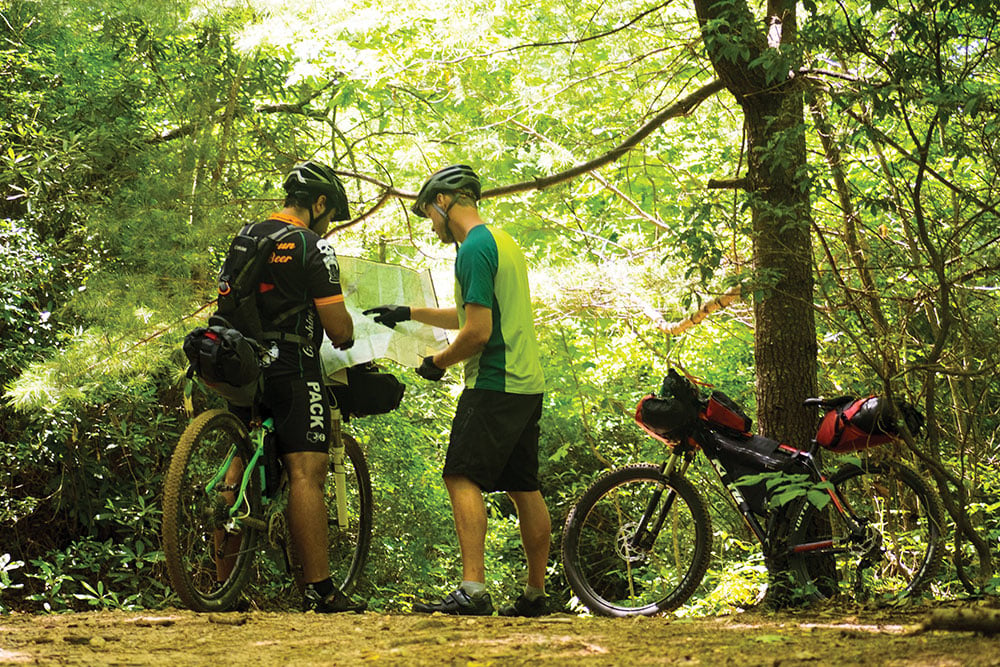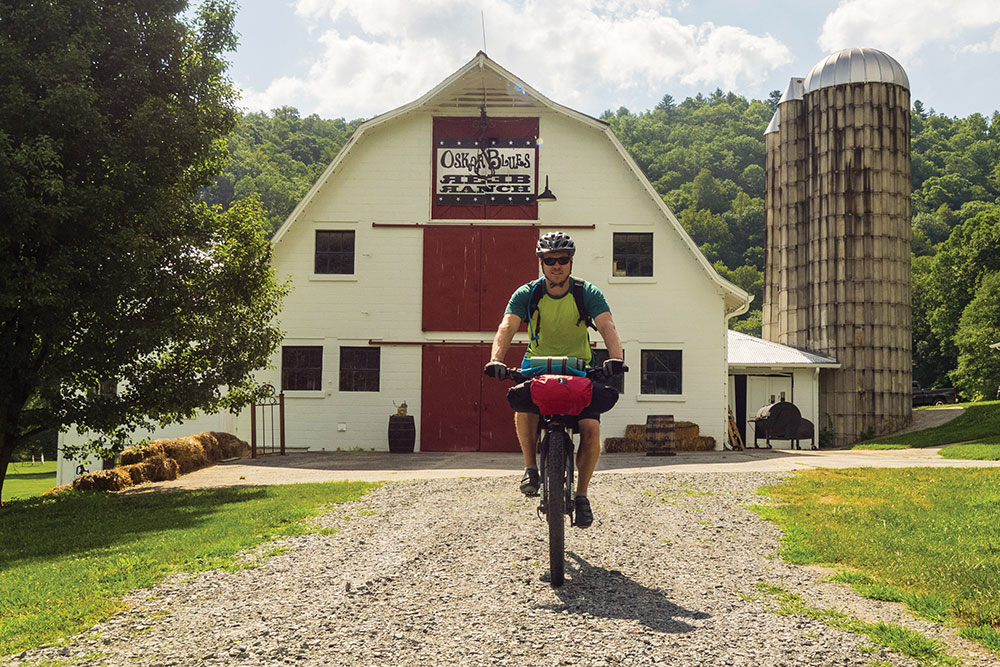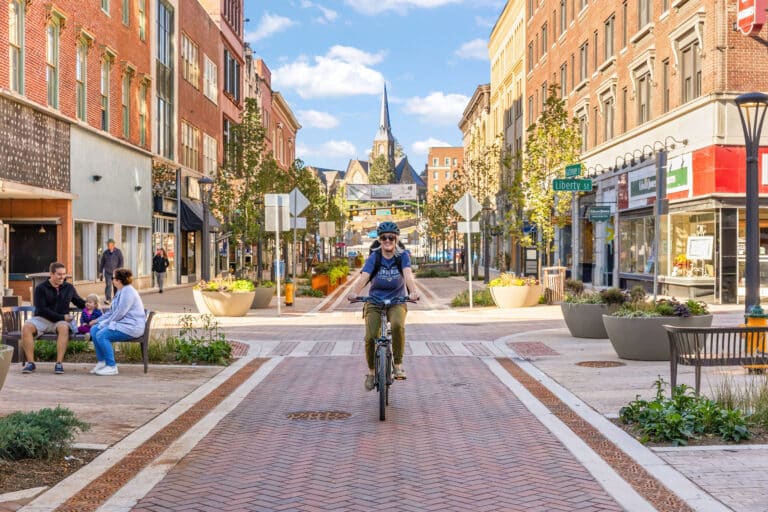A three-day mountain biking adventure through North Carolina’s Pisgah National Forest
We were only a mile out from Reeb Ranch when I began to question our plans. My buddy Boberts and I were riding loaded mountain bikes up DuPont Road, a paved highway with little shoulder. Hearing an SUV approaching behind us, I glanced back. A passenger was hanging out the window, preparing to give us a piece of his mind. Probably the typical, get out of the road.
“You guys rock!” shouted a friendly young man. He flashed two supportive hang-loose hand gestures and issued a roaring whoop.
Woah, I thought. Not what I expected.
During the 20-minute climb, more cars passed. One driver honked and fist pumped. Another yelled, “Killer!” A third slowed down to drawl, “Bad assss.”
By the time we reached the Lake Imaging parking lot, we felt like visiting dignitaries. A few riders came over to chat, inspect our brand new Revelate Designs bikepacking bags, shake our hands. One dude said we’d inspired him to join the sport. Two athletic ladies with arms buffer than my legs gave us approving nods. While I announced my candidacy for mayor of mountain biking, Boberts kissed a baby in a bike carrier, blessing the child with good fortune and fine riding stamina. Something we’d need ourselves to complete the trip.
This was our first bikepacking trip, after five years of traditional touring with racks and panniers. Our three-day plan was to start with a quick out-and-back to DuPont for a looksee at this popular trail network. From there, we’d pass through Brevard and into Pisgah National Forest, where we’d ride and camp for two days. Finally, we’d cross the Blue Ridge Parkway, ride the flowy singletrack of Bent Creek Experimental Forest, and end with a biking brewery tour of Asheville. Estimating the ride around 80 miles with 8,000 feet of climbing, we hoped this was a realistic first bikepacking trip.
To preserve our legs, we limited our DuPont visit to an easy route, mostly the Hilltop Trail and Buck Forest Road to the covered bridge above High Falls. On our way out, we stopped by the picturesque Triple Falls, made famous as a filming location for The Hunger Games.
Reeb Ranch (see what they did there?), where we camped the night before our ride, was established by Oskar Blues Brewery as a destination for mountain bikers, campers, and festival goers.

Our next stop was The Hub, a cycling shop and taphouse near the entrance to Pisgah. Here we purchased a topo map but skipped having another beer because we needed to hydrate—ahem, with water—for a big climb into the forest.
After a few miles on Highway 276, we veered onto a gravel road to begin a five-mile, 1,500-foot ascent to our first camp. Soon we were joined by two downhill day riders, which made for friendly conversation between heavy breaths.
“Two nights?” said one of the riders, incredulously studying our rigs. “Hope you have enough beer!”
We pointed out our HydroFlasks, which we’d filled up with our favorite flavors of campsite refreshment. The climb was a challenge, but the promise of chilled beverages offered plenty of motivation.
At Bennet Gap, we pushed up some rooty stairs and rode a final mile to the three-sided shelter we’d call home for the night. Boberts set up his hammock inside, and I pitched my tent in the grass. While Boberts expertly built a fire, I tied parachute cord to a rock and hurled it—for what felt like an hour—until I could barely lift my arm and we finally had a bear bag. Camp chores complete, we lounged in hammocks and sipped on ice cold Oskar Blues beers.
The next morning, we pumped water from a nearby spring and broke camp. From the junction, we rode west on the excellent Buckhorn Gap Trail. We zipped along smooth dirt single-track with the occasional loose cobble section, passing through fern forests and tree tunnels. Continuing onto South Mills Trail, we followed an idyllic mountain stream. Then we joined the scenic unpaved Yellow Gap Road. And if riding gravel is supposedly boring, then please just bore us for the rest our lives, thank you. Then we coasted at top speed, wind whipping past, downhill to North Mills Campground.
We’d originally planned to camp here and ride out to the Sierra Nevada Brewery that evening. But after 50 miles in 36 hours, the thought of an extra 16 miles gave us cyclist-in-headlights looks. Instead, we wisely filled our water bottles from a spigot and turned up a nearby gravel road. Three miles later we made a primitive camp on Bad Fork. The hammocks went up, we plopped inside, and spent the evening hours staring at forest canopy and listening to our screaming legs—I mean, a burbling creek.
Our third and final day was the best yet, even though it started with us pushing our heavy bikes up the Bad Fork trail. And yes, from there we rode the Blue Ridge Parkway for a few miles in the wrong direction, but eventually we caught the error. Then we dropped into Bent Creek Experimental Forest. The only forestry research we conducted was how fast can we ride flowy singletrack on loaded mountain bikes. The answer was fast.
We ended our trip riding surface streets to Asheville, where Boberts’ med-school buddies joined us. After a brief check-up, they pronounced us medically sound, welcoming us back to civilization like we were visiting dignitaries who didn’t have showers in our home country.
Apparently, 80 miles was the perfect length for a first bike-packing trip. So, off we went on our celebration. We started with IPAs at UpCountry Brewing, while we figured out which brewery to visit next. Probably All Sevens, followed by Oyster House, and perhaps The Whale, Cellarist, and/or Archetype? We discovered visiting all six would only take a few miles of riding onHaywood Road—but we’d probably limit ourselves to three stops. We hoped this was realistic for a half-day brewery tour.
Ours was just a three-day trip, but it felt like a week of fun. And speaking of a week, next time we might just extend the trip and ride it twice.
Cover photo: Oskar Blues Brewery operates the Reeb Ranch near Brevard, N.C. photos courtesy of the author







